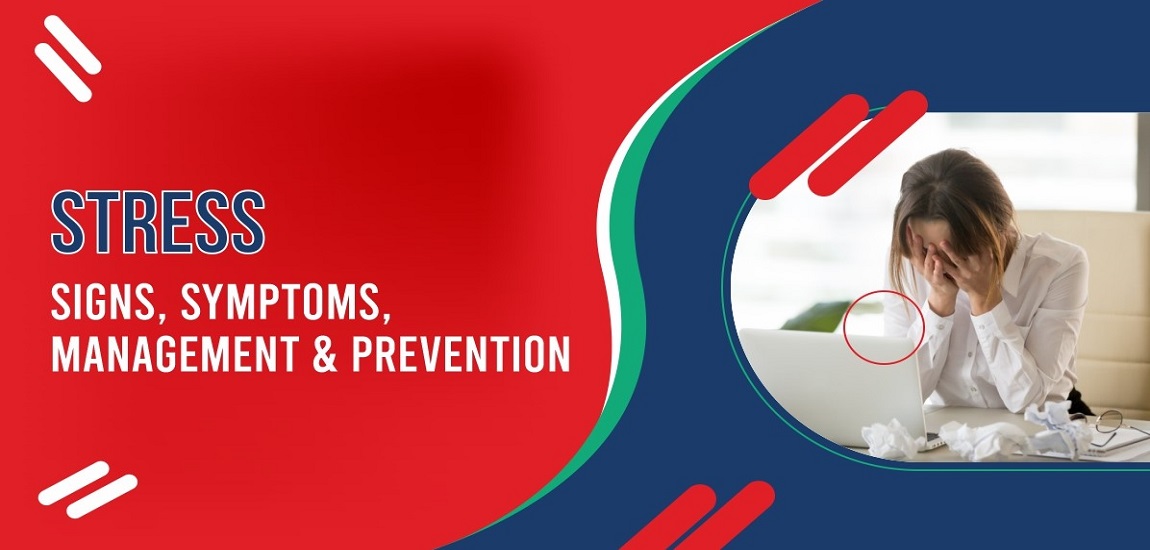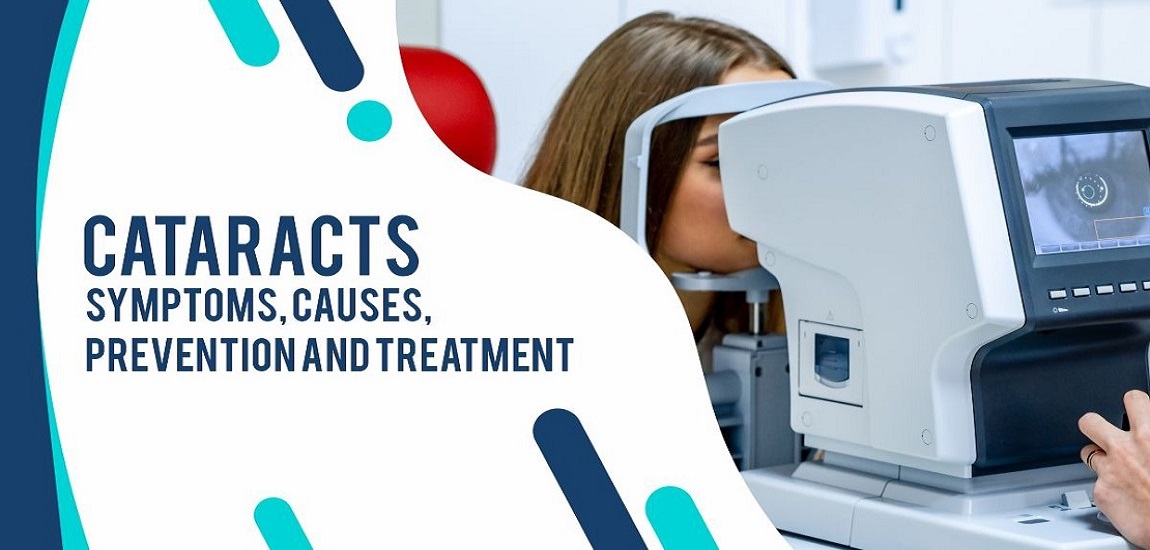
- By JRSH Admin
- In Health and Tips,
- Posted September 28, 2021
Stress: Signs, Symptoms, Management & Prevention
What is stress?
When you feel threatened or under pressure, your body responds to stress. The body responds physically and mentally to stress by adjusting to the change or challenge (stressor). Stress is what that is. A fight-or-flight response is activated in the body when it senses any type of danger, real or imagined.
A feeling of emotional strain or pressure can be described as stress. Stress is a form of pain. The emotion can be triggered by anything that causes you to feel frustrated, angry, or nervous.
The stress system consists of brain elements, of which the main components are the corticotropin-releasing hormone (CRH) and locus caeruleus (LC)-norepinephrine (NE)/autonomic systems, as well as their peripheral effectors, the pituitary-adrenal axis, and the autonomic nervous system that react to stress. Behavior and physical changes result from the activation of the stress system, allowing the organism to adapt.
A person may experience external stress as a result of a certain situation, but can also experience internal stress as a result of their perceptions, including anxiety and discomfort regarding the situation.
Stress is one way your body attempts to protect you. Maintaining your focus, energy, and alertness is possible when it is working properly. It is possible to save one's life under circumstances of emergency-you will be stronger to defend yourself. Despite this, stress no longer serves any useful purpose after a certain point and causes serious damage to your health, mood, productivity, relationships, and quality of life.
Types of stress
It is possible to be stressed positively or negatively depending on the circumstances. An upcoming wedding, the holidays, or pregnancy can cause positive stress (called eustress). Meanwhile, negative stress (called distress) triggers your body's full-blown stress response.
Positive stress (eustress): This type of stress is positive, helpful, exciting, and motivational. In other words, a person is more likely to experience positive stress when they feel confident in their abilities to cope with the stressor. It also boosts our ability to solve any problem, resulting in an improvement in our abilities and performance.
Negative stress (distress): It is the negative type of stress that is most often associated with feeling "stressed out". Those who are experiencing stress typically feel overwhelmed and anxious, suffer physical ailments, and engage in unhealthy behaviors. In other words, stress is caused when we believe that stressors are outside our control or ability to handle them. Stress is caused when we believe our coping skills are inadequate. The people in the world feel helpless because they lack the answers to the problems they face daily. Therefore, they tend to worry and behave unproductively.
Long-term stress and its consequences
Acute stress:
Stress that is acute is also called short-term stress. It comes from things like fighting with a loved one, getting criticized by your boss, or having your house broken into. Because acute stress typically goes away fairly quickly, your body can deal with it much better than chronic stress.
The signs and symptoms of acute stress
- Anxiety
- Irritability
- Mood swings
- Poor concentration
- Problems sleeping
- Recurrent nightmares
- Aggression
Chronic stress:
Unlike acute stress, chronic stress is considered "long-term" stress. Stress will arise if you are engaged in a toxic environment every day or if you are constantly fighting with your spouse. The stress of this sort can negatively impact your health because it seems to never end.
What Chronic Stress Looks Like
- Depression
- General unhappiness
- Anxiety
- Agitation
- Moodiness
- Irritability
- Anger
- Loneliness
- Isolation
Those experiencing chronic stress gradually experience higher resting heart rate, blood pressure, breathing rate, and muscle tension, which result in an overall greater effort to stay healthy.
In other words, chronic stress changes the balance inside your body. These changes can ultimately lead to a host of health problems, including high blood pressure, heart attack, chronic pain, and depression.
What happens to the body during stress?
Stress can sneak up on you surprisingly quickly, which is one of its most dangerous characteristics. You cannot manage your heart rate, breathing, vision changes, or other body functions without the autonomic nervous system. An anatomical mechanism called the "fight-or-flight response," helps the body deal with stress.
When a person experiences long-term (chronic) stress, the response to it continues, causing wear and tear on their body. A variety of symptoms develop, including physical, cognitive, emotional, and behavioral ones.
The signs and symptoms of stress overload need to be aware, which is why it's vital to be aware of them.
Cognitive symptoms:
- Memory problems
- Inability to concentrate
- Poor judgment
- Seeing only the negative
- Anxious or racing thoughts
- Constant worrying
Emotional symptoms:
- Depression or general unhappiness
- Anxiety and agitation
- Moodiness, irritability, or anger
- Feeling overwhelmed
- Loneliness and isolation
- Other mental or emotional health problems
Physical symptoms:
- Aches and pains
- Diarrhea or constipation
- Nausea, dizziness
- Chest pain, rapid heart rate
- Loss of sex drive
- Frequent colds or flu
Behavioral symptoms:
- Eating more or less
- Sleeping too much or too little
- Withdrawing from others
- Procrastinating or neglecting responsibilities
- Using alcohol, cigarettes, or drugs to relax
- Nervous habits (e.g. nail biting, pacing)
Causes of stress
Everyone experiences stress differently. Even the things that upset you may not bother your best friend. Typically, we view stressors negatively, such as an exhausting schedule or rocky relationships. Any extremely demanding task can be stressful, however. Events that are positive such as getting married, buying a house, going to college, or being promoted are included.
There are factors external to the individual that can cause stress, but not all. It is also possible to experience stress internally or to create it yourself, like worrying excessively about something that might or might not happen, or living with irrational or pessimistic attitudes about life.
There can be many causes that can cause stress, including:
- Being bullied
- Working too hard
- Losing a job
- Marriage or relationship problems
- Recent breakup or divorce
- Death in the family
- Difficulty in school
- Family problems
- Busy schedule
- Recent move
Stress, however, still causes the same reaction in our bodies. Your body responds this way because difficult or demanding situations cause your body to react. It affects the nervous system, the respiratory system, and the cardiovascular system. You may experience stress by sweating, tensing up, or even fast breathing. Additionally, it can give you a burst of energy.
It's a chemical reaction that prepares the body to react physically in case of attack, and this chemical reaction is known as the "fight-or-flight response." Nature gave our human ancestors this type of stress to help them survive.
It is especially difficult to cope with long-term stress. A steady flow of harmful changes to the body takes place over time when stress hormones remain elevated. An immune system that is suppressed for an extended period might develop diseases.
How much stress is too much?
Numerous physical and psychological symptoms can be caused by stress. When you are having stress and your body undergoes the below-listed changes that show the peak value of stress you have handled now your body is affected by the stress which leads you to different health problems. Sometimes you do not realize that stress is causing the symptoms you experience.
You may be affected by overexertion by the following signs:
- Diarrhea or constipation
- Forgetfulness
- Frequent aches and pains
- Headaches
- Lack of energy or focus
- Sexual problems
- Stiff jaw or neck
- Tiredness
- Trouble sleeping or sleeping too much
- Upset stomach
- Use of alcohol or drugs to relax
- Weight loss or gain
Many factors affect your ability to cope with stress, including:
Support from your network. Having a network of supportive family and friends serves as an important buffer against stress. It's easier to cope with life's pressures when you have people around you who you can depend on. Conversely, being isolated and alone can make you more vulnerable to stress.
Feeling in control of your life. Taking stress in stride is easier when you have confidence in yourself and your ability to influence events and persevere through challenges. Stress can most likely knock you off your course, however, if you believe that you have no control over your life -- and that you're at the mercy of your circumstances and your environment.
Viewpoint and attitude. Stress can be managed differently depending on how you perceive life and its inevitable struggles. Your vulnerability will be lower if you are generally optimistic. Stress-resistant individuals are adaptable, humorous, believe in a greater purpose, and accept change without complaint.
Emotional intelligence. Stress and agitation are more likely to result if you fail to regulate your emotions when you are feeling angry, sad, or troubled. It is possible to increase your tolerance for stress and bounce back from adversity when you can identify and deal with your emotions appropriately.
Understanding and preparing yourself. When you comprehend the details of a stressful situation, such as its duration and what to expect, the easier it is for you to deal with it. An accurate picture of what to expect after surgery reduces the stress of painful recovery, as compared to trying to recover immediately after surgery.
Diagnosis of Stress
Stress cannot be diagnosed with a specific test. To rule out different medical conditions, a healthcare professional usually conducts several tests (such as blood and urine tests, and other assessments).
Due to the similarity of your symptoms to depression, your healthcare professional should evaluate your mental state to determine if you might have a depressive disorder or anxiety disorder. When the stress triggering them subsides, for example, stress-related symptoms such as stress, anxiety, or insomnia typically disappear. However, these same symptoms may not disappear without medication or therapy when they are caused by depression or another mood disorder.
Using questionnaires, your healthcare provider can learn about your level of stress and its impact. Stress-related symptoms can be evaluated by your healthcare provider if you have chronic stress. Diagnosing and treating high blood pressure is one example.
Symptoms of stress may be the reason for your symptoms, so you may seek stress management strategies from your healthcare professional and make decisions about how to control the stressors in your life before your health is affected.
Reducing and Avoiding stress
Stress management is important to understand for coping with any kind of stress.
Exercise and meditation. You can start feeling better right now by increasing your activity level. By getting regular exercise, you can lift your mood and distract yourself from worry, helping you break the destructive cycle of negative thoughts. The rhythmic movements of walking, running, swimming, and dancing are particularly effective, especially if practiced mindfully (focusing on the sensations you experience while exercising).
Interact with others. You can experience a reduction in stress by having a simple face-to-face conversation when you're feeling anxious or insecure. Simply exchanging kind words with another human being or smiling at them can help calm your nervous system and relax you. Therefore, spend time with those who make you feel good, and do not let your responsibilities prevent you from having fun. You should prioritize building stronger and more fulfilling relationships if you don't have any close relationships or if your relationships are causing you stress.
Bring your senses to life. It is also helpful to engage one or more senses--sight, sound, taste, smell, touch, or movement--to relieve stress. To maximize your sensory input, you need to figure out what works for you. Are you able to feel calm when you listen to an uplifting song? Smelling coffee or ground coffee? Maybe it works quickly to make you feel centered to pet an animal? Each person reacts to sensory input differently, so you have to experiment to find what works best for you.
Relaxing techniques. The degree of stress in your life can't be eliminated, but you can reduce the effect it has. As a result of relaxing techniques such as yoga, deep breathing, and meditation, your body enters a state of rest, the opposite of the stress response. If you practice these activities regularly, you can reduce your daily stress level and feel more calm and relaxed. Under pressure, they also help you stay calm and composed.
Consume a healthy diet. Your eating habits affect your mood, ability to deal with stress, and ability to handle life's challenges. In contrast, eating a diet full of processed food, refined carbohydrates, and sugary snacks can worsen stress symptoms, while a diet rich in high-quality protein, fiber, and omega-3 fats, can help you cope with life's ups and downs.
Rest well. A tired mind can make you think irrationally, which can increase stress. Sleep can also be disrupted by chronic stress. Whether you struggle with falling asleep or staying asleep, there are plenty of steps you can take to improve your sleep so you'll feel less stressed, more productive, and emotionally balanced.
Conclusion:
Stress is prevalent in modern society. Almost every person experiences stress at least once a day. Even though it can be common for people to be stressed, it is more important to understand how to deal with this stress. You can cope with stress if you follow a healthy diet, perform regular exercise, and interact with family and friends regularly.
Regardless of whether you think stress is the source of your symptoms or have taken steps to control it, you should consult a doctor if symptoms persist. There may be other causes for your symptoms that your healthcare provider should consider. Alternatively, you can consult a professional counselor or therapist who can help you identify the sources of your stress and learn new coping strategies.
Feelings should not be kept hidden, they should be allowed to flow freely. It will relieve your body and mind of stress. Don't push stress inside your body. Everyone experiences stress. In that difficult situation, you will feel supported if you talk to someone about the problem. There is no doubt you will find a solution to that problem.
Tags
Blog Search
Latest Posts
-
Skin Ulcers Uncovered: Causes, Types, Symptoms, and Healing Options
January 13, 2026 -
Is Coconut Water Safe During Pregnancy? Benefits, Risks & Myths
January 08, 2026 -
Dark Circles Under The Eyes: Causes, Home Remedies and Treatments
December 21, 2025 -
बर्ड फ्लू के लक्षण, कारण, उपचार और बचाव के उपाय जानें
December 04, 2025 -
Best Diet Plan for Menopause Weight Management
November 25, 2025




